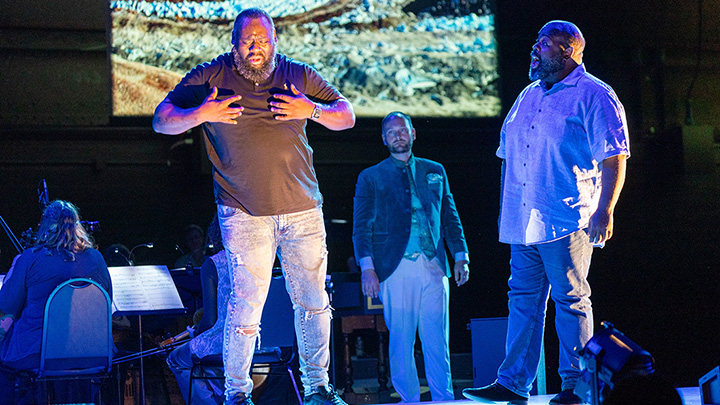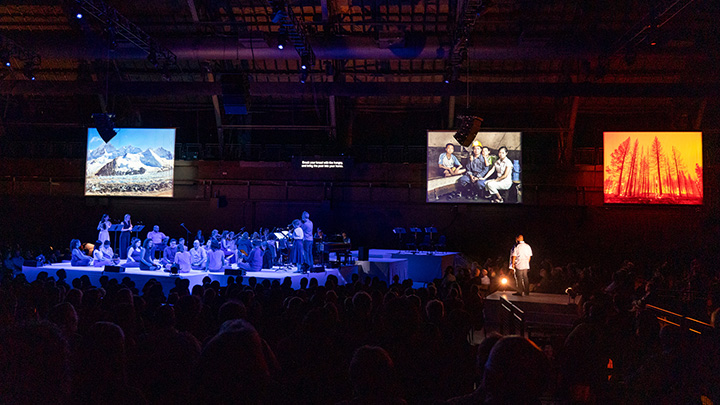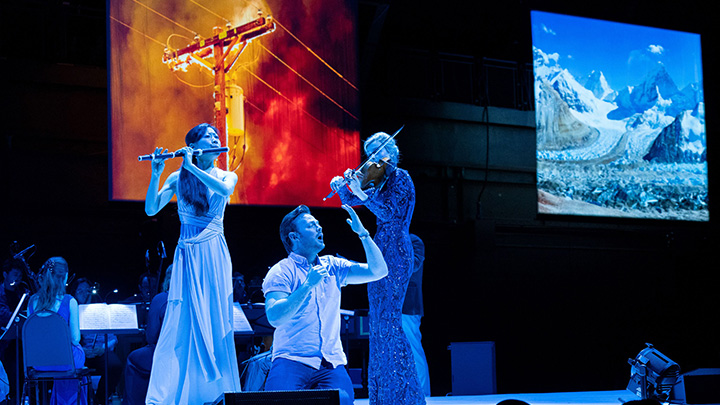
As someone with a day job that overlaps politics with activism, I am often at a loss when I see artists and artistic institutions make broad political statements through art. There seems to be an unexamined assumption, held by many well-meaning progressives in the arts, that they are contributing to the betterment of humanity through their creativity alone. I get the sense that they believe that the experimental form or radical content of a politically charged work really moves the needle for the moral universe. This tendency becomes especially egregious when it comes to giant issues like climate change.
There are very good reasons for making art about climate change: the coming doom will be the future and potentially the end of our species if we don’t do something about it. Artists can and should explore the topic inside and out. The problem rests more in the givers of the grants that keep the classical arts alive: the sponsors who demand that artists hit that climate change button without any organized, praxis-driven call to action. You can, nay must, have your climate action in the arts, but leave meaningful politics out of it if you want your work funded. Citibank and Bloomberg Philanthropies will not fund your climate revolution, so don’t bother asking.
Director Peter Sellars’s epic “musical call to climate action,” Shall We Gather at The River, performed May 21st at the Park Avenue Armory, was no exception to this rule. From the high resolution, dramatically staged Coal + Ice photographs of forest fires, melting icecaps, flooded homes, and child coal miners, to the hip-hop dancers moving to the beat of Bach cantatas, it had all the hallmarks of a fashion show curated by Edina Monsoon. While each performance individually was excellent, nothing connected well, and most attempts to interrelate the Bach with the Black American spirituals at best achieved an abstract intellectual semblance when it was obviously designed with an appeal to emotion.
That being said, the actual choices in repertoire were excellent. The pairing of the Bach cantatas with the Black American spirituals drove the connection home. Death comes for all of us, and to humble yourself before God is indeed a strong and needed concept in our era of waste and violence done to each other and to the Earth. Had the performance been all about the music and performed in a low-key space with a smaller audience, more appropriate to chamber music, I think the work would have clicked better. Its pretentions, the Coal + Ice photographs, the theatre in the round performance with singers placed at random spots around the room, sometimes singing to us, sometimes to each other, and sometimes at nothing at all, gave the performance a finicky and hollowed out affect that consistently turned away from audience engagement.
The one performer who was able to break through the overall pomposity of the direction was countertenor Reginald Mobley. His baroque singing was solid and his renditions of Black American Spirituals were outright brilliant. Mobley, together with his co-performer, the dancer Reggie (Regg Roc) Gray, an originator of the FLEXN style of dance, brought an otherworldly splendor to the proceedings. You couldn’t take your eyes off Gray’s elegant jouncing motions and Mobley’s soaring voice practically transcended this mortal coil. The countertenor made me think hard about the male falsetto and how naturalistic it sounds in nearly every kind of singing culture except that of Western classical music.
Tenor Nick Pritchard also sang spectacularly and valiantly engaged with the dancers on stage while singing Bach cantata (no easy feat.) The choir, soloists, instrumentalists, and dancers, each in their individual element, were wonderful and I think in concept the performance rested on a solid foundation. It suffered from not having taken its own advice: humble yourself before God, get down on your knees, and pray for salvation. On climate change action I genuinely want to be taken to church. I want to come to Jesus and to have the scales fall from my eyes. I want to commune with my fellow lost souls as we behold the might of nature and the doom that will be visited upon us if we continue to screw over Pachamama. Sellars had all the right musical elements but entirely the wrong politics to make an effective call to climate action in Shall We Gather at the River. Alas, climate church doesn’t happen when it’s funded by the same corporations that are perpetuating the coming apocalypse. Rest assured that for the brave souls who get sent to prison for blocking oil pipelines, Citibank-sponsored climate performance art isn’t remotely on their radar.
Photos: Stephanie Berger, courtesy of Park Avenue Armory




